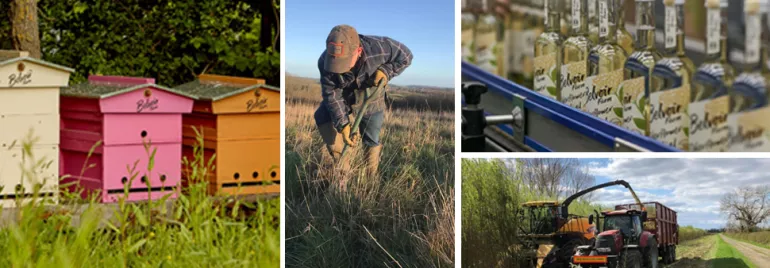Are you looking to hire?
Find the right candidate today.
We're aware of a global phishing scam impersonating employees via email, WhatsApp, and Telegram, but no PageGroup systems have been breached. Find out how to protect yourself

As manufacturing businesses set their sights on achieving net-zero goals, educating the workforce in sustainable manufacturing practices becomes paramount.
Did you know 31% of professionals in engineering, manufacturing, procurement, and supply chain are seeking new roles to learn new skills like these? Find more hiring trends and industry salaries from our 2024 salary guide for engineering, manufacturing, procurement, and supply chain.
Reports also reveal growing pressure from global consumers, with 38% believing businesses should prioritise responsible production and consumption of goods and services. The journey towards sustainability not only demands a commitment to change but also a collective upskilling in sustainable practices. How exactly can manufacturers set forth on this path?
Meet Belvoir Farm – the Leicestershire-based premium drinks manufacturer supplying 20 to 30 million units annually to UK and global supermarkets, cafes, and garden centres, driven by an ethos of all-natural ingredients. Enter Martin Reynolds, the Engineering Manager driving Belvoir Farm's commitment to sustainability, from local community engagement to ambitious carbon footprint reduction targets like 100% green electricity by 2025 and net zero by 2030.
Read his exclusive interview with Holly Antonia Butler, Business Director in Procurement, Supply Chain & Manufacturing at Michael Page, for an inside look at sustainable manufacturing initiatives, making an impact in the food and drink industry.
A: The drive grew within the business to make Belvoir Farm a leader in the drinks industry around 2019. We kickstarted our sustainability journey by assessing our carbon emissions as a base before setting targets and developing a strategy to reduce emissions.
A: We foster a collaborative approach with green team meetings where we share ideas to reduce our carbon footprint. Some of our initiatives that embody this include:
Initiatives like these help us live and work in balance with our ingrained sense of environmental responsibility.
A: At Belvoir Farm, reducing our carbon footprint is an always-on effort. We focus on energy-efficient practices, from using LED lighting to water reduction in cleaning processes, incorporating energy-efficient motors and pumps with inverter drives.
We’ve embraced alternative green fuels like BioLPG for our forklift trucks, and we track all waste material for recycling and reuse, ensuring nothing goes to landfill.
A: With the UK committed to reaching an ambitious goal of net zero by 2050, it’s important for companies like ours to upskill workers. Sustainability requires combined efforts from cross-functional teams with varied skill sets. We see the potential for sustainability expertise in various roles across our business, contributing to our goals.
The challenge lies in identifying skilled talent aligned with our commitment to Environmental, Social and Corporate Governance (ESG) and DE&I, but we’ve been fortunate to share a true partnership in our association with Michael Page for over ten years.
Frank Fitzgibbons, Production Director at Belvoir Farm added:
Recruitment is a time resource that is not always available in business’s our size. We’re pleased with the level of communication that we receive – we’re kept up to date without being overwhelmed.
Their recruitment expertise and support has been crucial, especially across our recent sustainability projects and initiatives, engaging our team and helping us progress toward our sustainability targets.
Could you benefit from local insights backed by global reach? Learn what Michael Page Procurement and Supply Chain can do for you.
Explore Michael Page Procurement and Supply Chain
A: From sourcing ingredients with an eye on sustainable suppliers to keeping our distribution partners within a three mile radius, we're cutting road miles and boosting eco-friendliness.
Our packaging journey is equally impactful – every bottle finds a second life through reuse or recycling, leaving minimal waste that never goes to landfill. Annual waste stream audits ensure our commitment is not just a promise but a reality, handled efficiently and responsibly.
We remain committed to our core range remaining in glass bottles, focusing on reuse over recycling. We’re exploring innovations like bamboo and paper bottles in line with our goal of long-term sustainability, when the technology becomes feasible for mass production.
In 2023, we expanded our product line to include aluminium cans, providing our customers with a more sustainable option with an improved recycling lifecycle. This initiative involved a substantial investment of £1.7 million in a cutting-edge canning manufacturing line. This investment not only propels us closer to our sustainability objectives but also enables us, as a third-party manufacturer, to assist smaller beverage companies in adopting a more environmentally friendly alternative. Belvoir Farm is not just crafting beverages; we're cultivating a greener future, one sip at a time.
The biggest challenge lies in sourcing external grants for green energy, often elusive for SMEs. Belvoir Farm, though faced with tough trading conditions, undertakes deep scoping exercises to find cost-effective options and suppliers to help deliver our self-funded projects.
A: No matter what business or industry you’re in, the advice I’d give to any company is to make a start. However small, it makes a difference. Here are my top five tips to get started:
As we toast to Belvoir Farm's remarkable journey towards sustainability, it's evident that driving change requires not just dedication but the right partnerships.
If you're in the business of food and drink, and eager to integrate sustainability seamlessly and seeking industry experts who understand the nuances of your vision, Michael Page stands ready as your strategic ally.
Request a call back from one of our experts at Michael Page today for recruitment services that go beyond the ordinary.
We’re experts in finding the best people for jobs in procurement, supply chain, HR, finance, and technology to name a few. Explore our areas of expertise.